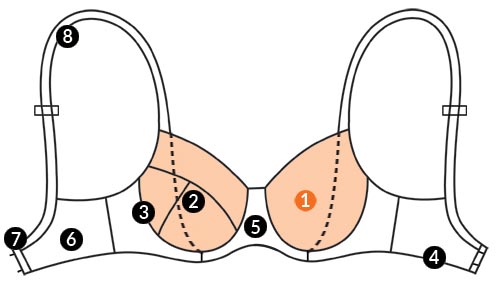Let's take a journey through the next few pages together. Get to the end, and I promise you'll have a better fitting bra size.
HerRoom CEO/Founder
The way a bra is cut, assembled and sewn has a big impact on how it fits your unique shape. In this section we'll dissect each part that goes into a bra and explain its function and how it affects your bra fit.

A cup size letter, such as a C cup, is not equal in volume across all band sizes. Here is an example: say you are a 36C. If you move to a 38C, your band size goes up and so does your cup size by one size. If you move down to a 34C, your band size goes down and so does your cup size by one size. If you want a larger band size but want to keep your same cup size, you should move to a 38B. If you want a smaller band size but want to keep your same cup size, you should move to a 34D. Also see Your Sister Bra Sizes for a more detailed explanation.
The cup size letter is actually a measurement of how far your breasts project from your chest wall. Each letter denotes a 1" increase in your body’s circumference around your bustline. When you take your bust circumference measurement and subtract your under bust circumference measurement, the remaining inches represent your cup size. A C cup, for example, is a 3" difference between these two measurements. A 3" difference is a big deal with small band sized women, but not such a big deal with larger band sized women. A C cup shape and depth changes with each band size.
Women with cup sizes larger than a D cup have an added challenge because many bra manufacturers have chosen to create their own letter naming conventions. For example, a DDD cup size is called an E cup size in some brands, and an F cup size in yet other brands. So, if you don’t know how a certain brand names their cups, you can wind up with the wrong cup size and think the bra is running too small or too large in the cups.
My suggestion is to figure out how many cup sizes larger you are than a D cup. Say you are a G cup size in Chantelle. This means you are three sizes larger than a D cup. Now, you can look at any bra, see how they name their cup sizes, and count up three cup sizes from their D cup size to find your size. At HerRoom, when you look at the sizes available for any of our bras, we always display the cup sizes in order from smallest to largest. So, in our Chantelle example, find the D cup in the bra you want, count up three sizes, and you’ll arrive at a G cup.
In an effort to help you find your cup size in any brand, HerRoom has created the Universal Cup Size™ system, which we display to the right of every D cup size and larger. Keeping with our suggestion about finding how many cup sizes you are starting at a D cup, our system is simply that number with a D. So, if you are the next cup size after a D cup, you are a D2. If you are seven cup sizes larger than a D, you are a D8. We make this all very simple. Just UCS® using our simple tool, and you can search for bras on our site using your UCS®. Or, see your UCS® on all our bras when you look at our size drop down

Universal Cup Sizing™ Cup sizes larger than a D are called different letters by different brands (a DDD cup size in one brand can be called an E or F in other brands). So know your Universal Cup Size™ and you can find your correct size in any brand at HerRoom. Learn how to find your Universal Cup Size™.
Of course, HerRoom also has our fabulous brand size comparison chart as a quick reference in our Bra Sizing By Brand area.
Bra Cup Styles
Find your best bra size
Fast
No measuring tape needed
Let's take a journey through the next few pages together. Get to the end, and I promise you'll have a better fitting bra size.
HerRoom CEO/Founder
Find your best
Bra Styles
By Tomima
You know your bra size. But, do you know your breasts? Sounds like a funny question, but certain bras styles and features work better for some breasts and not for others.
Answer the following questions, and I promise your new bras will make you look younger and thinner!
We are sorry we are unable to assist you further.